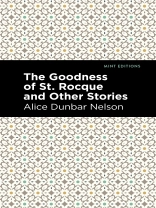The Goodness of St. Rocque and Other Stories (1899) is a short story collection by Alice Dunbar Nelson. Dedicated to her husband at the time, the poet Paul Laurence Dunbar, The Goodness of St. Rocque and Other Stories is a collection of brief vignettes of Creole society in nineteenth century New Orleans. Exploring themes of prejudice, faith, and romance, Dunbar Nelson crafts a poignant and unforgettable work of fiction. Manuela is a popular young woman of status in New Orleans’ thriving Creole community. Like many women her age, she hopes to marry a handsome and successful man. Setting her sights on Theophile, she prepares to be courted in the traditional manner of her people. When rumor gets out that he has been spending time with Claralie, a beautiful blonde, Manuela is forced to seek supernatural assistance. She visits a seer known as the Wizened One, who advises her to pray at the altar of St. Rocque. Determined and unwilling to give up what she believes will be her destiny, she makes her way to the church to begin her first novena. The Goodness of St. Rocque and Other Stories collects fourteen stories of life in New Orleans’ Creole community by Alice Dunbar Nelson, a leading figure of the Harlem Renaissance. This edition of Alice Dunbar Nelson’s The Goodness of St. Rocque and Other Stories is a classic of African American literature reimagined for modern readers.
Since our inception in 2020, Mint Editions has kept sustainability and innovation at the forefront of our mission. Each and every Mint Edition title gets a fresh, professionally typeset manuscript and a dazzling new cover, all while maintaining the integrity of the original book.
With thousands of titles in our collection, we aim to spotlight diverse public domain works to help them find modern audiences. Mint Editions celebrates a breadth of literary works, curated from both canonical and overlooked classics from writers around the globe.
Mengenai Pengarang
Alice Dunbar Nelson (1875-1935) was an African American poet, journalist, and political activist. Born in New Orleans to a formerly enslaved seamstress and a white seaman, Dunbar Nelson was raised in the city’s traditional Creole community. In 1892, she graduated from Straight University and began working as a teacher in the New Orleans public school system. In 1895, having published her debut collection of poems and short stories, she moved to New York City, where she cofounded the White Rose Mission in Manhattan. Dunbar Nelson married poet Paul Laurence Dunbar in 1898 after several years of courtship, but their union soon proved abusive. She separated from Dunbar—whose violence and alcoholism had become intolerable—in 1902, after which Nelson taught at Howard High School in Wilmington, Delaware for around a decade. She continued to write and earned a reputation as a passionate activist for equality and the end of racial violence. Her one-act play My Eyes Have Seen (1918) was published in The Crisis, the journal of the NAACP. Dunbar Nelson settled in Philadelphia in 1932 with her third husband Robert J. Nelson and remained in the city until her death. Her career is exemplified by a mastery of literary forms—in her journalism, stories, plays, and poems, she made a place for herself in the male-dominated world of the Harlem Renaissance while remaining true to her vision of political change and social uplift for all African Americans.












